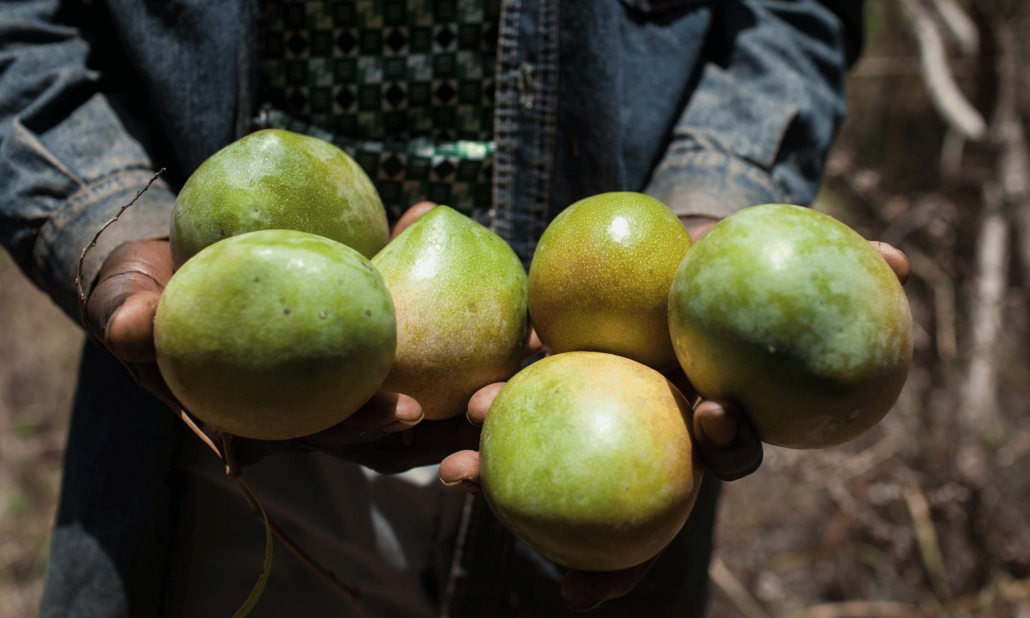Upromabio
Upromabio: Mango and Hibiscus Producer based in Burkina Faso
Upromabio was founded as a co-operative in 2009. Based in Burkina Faso, the co-operative works with over 100 farmers, including 43 male mango farmers and 56 female hibiscus farmers.
During Fairtrade Fortnight 2022, we brought our supporters and farmers together in a series of online events, to discuss the issues faced in different regions of the world.
In West Africa, we heard from the region's Shared Interest Lending Manager, Divine Buo, who joined us from Ghana, and Ethienne Christian Dioma, Director of Upromabio, who joined us from Burkina Faso.
Image: A mango farmer chops mangoes.
The Impact of Fairtrade and your Ethical Investment
Divine began by giving an overview of our finance provision in this region, explaining how the majority is focused on cocoa (77%), with a small amount supporting the production of nuts, fruit, soy, coffee and handcrafts.
Divine said: “The effects of climate change differ locally, nationally and regionally, affecting livelihoods, as well as food and water security. In West Africa, daily temperatures range between 25 to 30°C, providing very humid conditions.
“One of our customers lost 20MT of mango due to a change in weather pattern, another customer was forced to sell their produce below market price because erratic weather damaged the quality of the harvest.
“The co-operatives we are working with are also shifting towards climate mitigation initiatives, such as organic farming, improved farming techniques and educating members on the importance of sustainable farming.”
Ethienne said: "Upromabio has a drying unit where we produce dried mango, dried hibiscus and mango puree. We export to four buyers in Europe, based in Germany and France."
Speaking about the impact of Fairtrade certification, Ethienne told us: “There have been some great achievements through the Fairtrade Premium, these include: the construction of a drying unit with an average production capacity of 15MT of dried mango per year, a school in Toussiana currently housing 200 students, maintenance of a one-acre school orchard and the establishment of a half hectare mango tree nursery.
Speaking about the impact of our support on Upromabio co-operative, Ethienne said:
"We began working with Shared Interest in 2019, and without this support, we would have made only 50% of our orders."
Supporting Producers in Responding to Climate Change
Speaking about the impact of climate change on his organisation, Ethienne said: "We have seen a huge impact as a result of climate change. We are seeing intense parasitic attacks on our mango fruits, flowers have been dried out by heat or torn by strong winds, insufficient or poorly distributed rainfall causes immature fruit harvests. All of this is causing a reduction in production yields and processing capacity, meaning producers are unable to fulfil orders and risk losing customers.
"So far, Upromabio has implemented a range of mitigation measures, such as the establishment of a drip irrigation system in the school orchard, training in water retention, tree pruning and organic manure, and the installation of ventilation in dryers to reduce product losses after drying from 5% to 1%.
“Over the next five years, we aim to improve the productivity of existing mango orchards, and encourage the planting of more pest and disease resistant orchards taking into account the experiences acquired in current training and monitoring. For the hibiscus harvest, we will encourage tailored practices that take into account difficult climatic conditions.
“We will also increase our processing capacity to 50MT per year for dried mango and 10MT of mango puree. We will diversify by focusing on the local market and also other regional Africa markets as well as European buyers.”

Question and Answer Session
During our Fairtrade Fortnight event with Ethienne and Divine, guests had the opportunity to ask the speakers some questions.
Divine was asked: What is rainwater harvesting? What is rainwater storage? And why is rainwater harvesting and storage important for farmers?
Divine said: “With Burkina Faso being located in the northern part of the region it experiences just one rainy season per annum. The moisture from this rain is supposed to support productivity throughout the year. So rain harvesting initiatives such as construction of mini dams to harvest the rain water during the rainy season, and the digging of mini boreholes are practices that conserve water which is essential to combat the impact of droughts.”
Meanwhile, Grace, our Customer Representative for West Africa, was asked: What are hibiscus flowers used for?
Grace said: "The hibiscus is mainly used to produce tea, and a small number of beverage drinks"
Kwami, our Customer Representative for West Africa, was asked: Why are mango producers male and why are hibiscus producers female?
Kwami said: “This is due to land ownership. In Burkina Faso and other parts of Africa, land is owned by men and not by women. As mango is a long-term product requiring land, it is farmed by male farmers, hibiscus on the other hand is a short-term product and therefore is farmed by women. Upromabio has a strategy to work with both male and female farmers in this way.”
Invest with us today and create a fairer world for thousands of farmers and artisans across the globe.
Support our work
